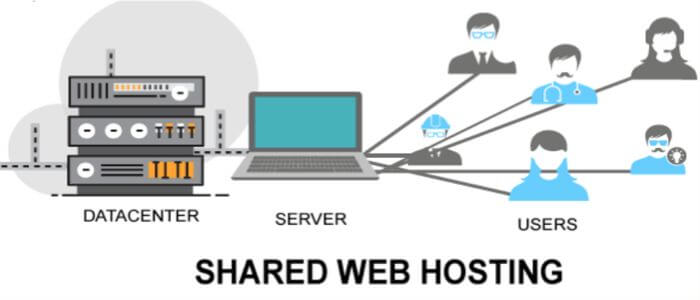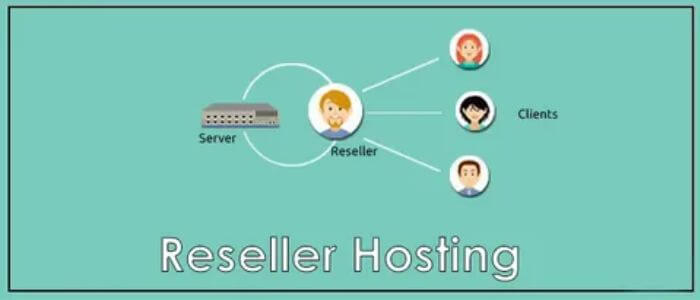What are different types of hosting and how it works
Learn how web hosting works and what are the different types of hosting available today.
There are many different types of hosting services available for website owners these days. I’ll talk about how web hosting works and different types of hosting.
A web server is physical hardware that sends information to your computer and displays the pages you are viewing.
Web hosting refers to a service that provides an Internet domain name and space for content, typically at a particular geographical location on the World Wide Web.
You can purchase hosting services from web hosting companies or shared hosts. There is a huge number of hosting companies, so you need to do some research, like reading reviews, to choose a good host.
There are different types of web hosting available. The most basic type is dedicated server hosting in which you are provided with a physical server that is exclusively yours, and which you have full control over and do not share with anyone else.
Dedicated servers will often be hosted by the company itself, although sometimes they’re outsourced to third-party providers.
With this option, you also have complete control over the root access of your machine and exactly how your server is set up. If you don’t need full control of your server, then managed hosting might be a better option.
Managed web hosting is when you are given full access to your own virtual or dedicated server, but someone else takes care of the maintenance and admin functions that are involved with that type of machine. You may be able to pick and choose which features you want to be installed on your machine, how it’s configured, what software is on it, etc.
The third main type of web hosting service is known as co-location. This option puts your site on the same physical equipment as other websites, but it still gives you some kind of control over how things are set up.
Let’s dive into deep web hosting types. Here I discussed 10 different types of web hosting.
Different Types of Hosting
1. Shared Hosting

Shared hosting provides you with unlimited access to resources and allows for control over the data that you upload to your server.
Before deciding whether or not to use shared hosting, make sure that the amount of space on your server is adequate for the amount of traffic that you are receiving. If you are not certain about these things, there is a good chance that you should at least invest in dedicated hosting.
Advantage of Shared Hosting: You will have access to a lot of resources and reduce expenses by not having to buy your own dedicated server. Reasons to Avoid Shared Hosting: Shared hosting is generally less secure than other types of hosting, as many people share the same resources.
2. Reseller Hosting

Reseller hosting provides you with unlimited access to resources and allows for control over the data that you upload to your server, but reseller hosts take a percentage of the revenue from your website. If you are considering using reseller hosting, you should make sure to check with the company about exactly what revenue they take from your sales so that you know how much of a cut they will be taking.
Reseller Hosting Advantages
You have access to a lot of resources and reduce expenses by not having to buy your own dedicated server.
Reseller Hosting Disadvantages
There is often a percentage fee taken for any sales that you make, which could eat into your profits.
3. VPS Hosting

Linux Virtual Private Server (VPS) hosting allows you to run your applications on a server that is hosted in a data centre, but it also gives you the freedom to install software and use your server as you wish. With this type of hosting, you are provided with an operating system and storage space. You can also set up your own DNS, and email servers and install any type of application that works with Linux.
4. Cloud Hosting

Cloud hosting: Cloud hosting provides you with an array of benefits that you do not get with other hosting options. If you’re looking for a transparent, expandable and highly scalable option, cloud hosting is a good choice. You can carry out maintenance to your site and make revisions whenever you want.
Basic blogging platforms such as Blogger, Typepad and Tumblr all use cloud-based hosting models. This means that information about all posts and pages is stored in the cloud on remote servers. The blog owner or administrator has access to a restricted area of this server where they can manage their blogs.
5. Dedicated Hosting
Dedicated hosting: Dedicated hosting is a good choice for small and medium-sized websites. It offers you full control over exactly how your server will be configured. Dedicated servers are also often provided with extra services such as special graphic design software, tiered support, dedicated IP addresses and much more. The downside to this type of hosting is that it can be expensive if you are not using the extra packages that are available through the company.
6. Managed Hosting
Managed hosting is a type of hosting service that gives you the support and server resources that you need to run your website. This type of hosting is very popular with website owners as it allows them to have support staff do their everyday tasks for them. There are many benefits to managed hosting:
The pros and cons of this type of hosting include the fact that if there is an emergency, you will not be able to handle it by yourself.
7. WordPress Hosting
WordPress is the most popular content management software in the world. An increasing number of hosting providers offer support services for WordPress, so it is important that you look carefully into their storage and bandwidth limits when choosing a host. It is also important to check exactly what operating system your website will be hosted on, as there are many different operating systems available.
8. Lite Hosting
Lite Hosting: Lite hosting is an alternative to shared hosting where you have complete control over your website but it may only be accessible to a certain number of visitors at any given time.
9. Specialty Hosting
Speciality hosting: Specialty hosting refers to companies that are dedicated to serving their customers a niche product such as e-Commerce websites, storefronts, mobile app sites and complex websites. They have enough knowledge to help you create a custom website that meets your needs.
10. Co-Location Hosting
Co-location hosting: In co-location hosting, your server is placed at the same physical location as the web host’s own servers.
How Web Hosting Works
Web Hosting works according to the client-server model. The client is the computer that accesses the server, requesting information in a web page (for example, by entering a URL in its browser).
The server is the system on which that page is stored, residing on a host machine. It serves either file directly or instructions for generating pages from a database.
The word “web” implies the World Wide Web (WWW orW3) which uses HTTP as its protocol.
An older meaning of web hosting service meant offering HTML pages and related resources with Internet Information Server (IIS) or other web server software.
Web hosting service specifically offering HTTP compression, typically gzip compression, is called “gzip web hosting”.
Main hosting companies offer services that are targeted at very specific niche markets. For example, a host specifically for e-commerce sites (DiscountASP.NET) or one for sites using the popular WordPress blogging software (Such as Bluehost).
Any company offering web hosting services must provide a properly configured server environment that has been designed to handle web traffic.
The exact requirements for how many servers and what configuration they should have depends on the provider’s market niche, its target customer base, and the brand image it wishes to project.
For example, some companies may wish to offer a very robust, service-oriented product while others may opt for a ‘bare bones’ approach with low overhead costs such as Linode.
Cheap hosting is a specific type of web hosting service that uses shared servers. It is generally provided by small and often independent companies, many of which are located overseas.
While these services may be suitable for small personal websites or internet forums, they often lack the resources to serve complex or high-traffic sites properly.
Issues such as server performance and downtime will frequently arise with cheap hosting services, especially for sites that do not have low traffic levels.
Most web hosting providers use virtualization to create a virtual host. There are two types of virtualization: hardware level and OS level. Hardware-level involves using specialized hardware to host fewer users per machine while OS level uses software to accomplish the same goal.
How to buy Web hosting at a low price
The average web hosting contract lasts between 12 to 36 months, with some providers offering up to 60 months (five years). Today, some providers offer you to buy hosting packages on monthly basis.
Cloud hosting providers like Google Cloud, Digital Ocean, Vultr and other providers have hourly-based billing. Here you will be billed on how many hours you have used the resources.
The terms of the contract will specify what services are provided by the host, how much space the website will use on its server, and how much bandwidth is allotted.
Such contracts may also state restrictions on what type of web content is permissible for the site. Contracts may also include options for renewal, cancellation, or transfer of ownership.
If you want to purchase good-quality hosting at an affordable price, you can choose Hostinger. You will get Hosting coupons on various coupon sites for more discounts. Search for Hostinger coupons on Google.
Most price comparison sites include only hosting providers that feature a money-back guarantee to protect consumers from fraudulent advertising practices and hidden cost claims.
| Go Homepage | Homepage |
| Post Category | Skill Development |
